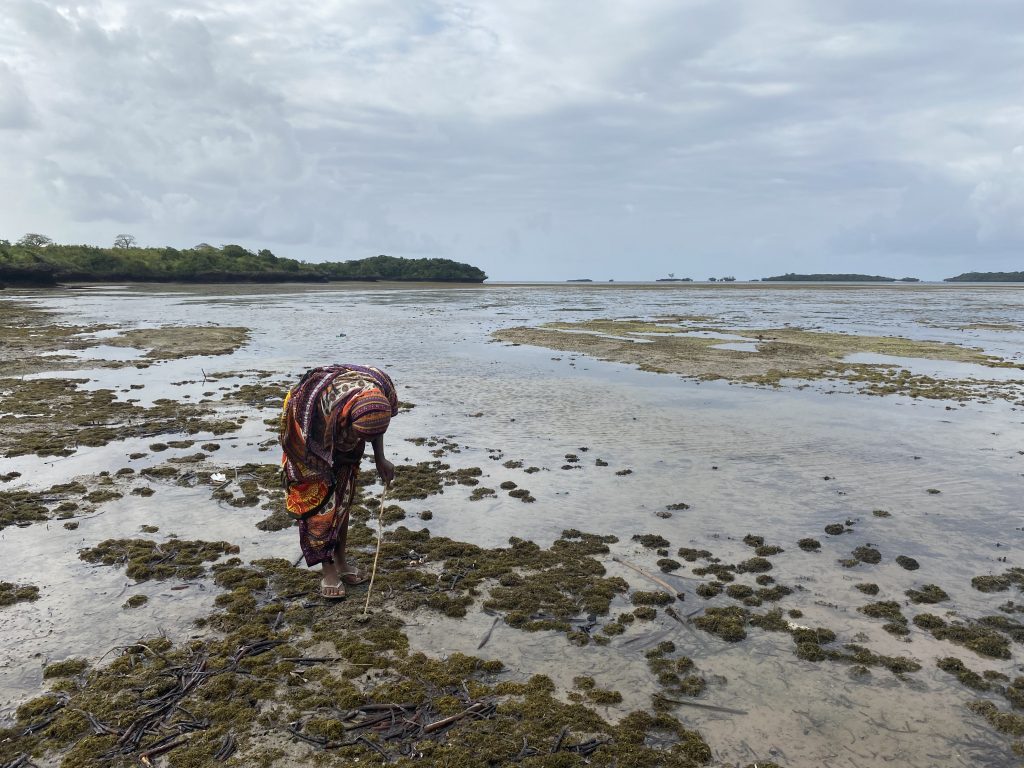See below for English version
Im Morgengrauen führt sie der Weg über das Riff, welches bei Ebbe den Strand der Wasini Insel bildet. Mit gebeugtem Rücken und bewaffnet mit einem gespitzten Stock überprüft Mzungu Athman die Felsspalten und Tunnel des Riffs. Für das untrainierte Auge sind die Oktopusse fast nicht auffindbar. Nicht so für die octopus hunters of Wasini Island.

Ungefähr 50 Oktopus-Fischer:innen finden sich auf der Insel im Süden Kenias. Wenn das Wetter es hergibt, können sie bis zu 16 Tage im Monat auf die Jagd gehen. Denn obwohl die meisten Fischer im Lande Männer sind, führen die Jagd nach Oktopussen traditionell überwiegend Frauen aus. Und so schaffen die Korallenriffe eine Lebensgrundlage für die weibliche Bevölkerung der Insel.
Athman ist seit ihrem Abschluss im Jahre 2010 eine von ihnen. Sie ist dankbar, denn trotz ihrer Scheidung hatte sie dank dieser Arbeit genug Geld, um für die Schulgebühren ihrer Kinder und ihre grundlegenden Bedürfnisse aufzukommen. So musste sie sich nicht schnell darum bemühen, zu heiraten, sondern konnte auf ihren eigenen Beinen stehen.
Diese Art der Fischerei sei besonders nachhaltig, betont Athaman. Die Umwelt werde nicht zerstört, da sie nur einen Stock benutze. Auch habe ihre Arbeit keine schwerwiegenden Auswirkungen auf die Oktopuspopulation. Weder fische sie die Riffe leer, noch habe sie ungewollten Beifang.
Doch seit einigen Jahren habe sie das Gefühl, es gebe ein Problem, für das sie selber keine Lösung finden könne. Als sie vor 13 Jahren startete, hatte sie einen Fang zwischen vier bis fünf kg. Heutzutage seien es ein bis drei kg. Dabei kann sie für einen Kilogramm 350 Schilling (knapp 2 €) verlangen. Das reiche bei weitem nicht aus, um sie und ihre Kinder zu versorgen. So musste sie sich eine alternative Lebensgrundlage schaffen. Nun betätigt sie sich auch als „seeweed-farmer“ und „mama karanga“. So werden Frauen bezeichnet, die gebratenen Fisch an die Gemeinschaft verkaufen.
Seit Jahren immigrieren die Oktopusse in andere Gebiete, weiß Mwatuwe Keya. Er ist Sekretär des Beach Managment Unit (kurz BMU) in Mkwiro. Die Organisation ist gemeinschaftlich organisiert und kümmert sich um alle Interessen der sog. blue economy auf der Insel. Vermehrt sterben Fische und Oktopusse in der Gegend. Keya vermutet, es liegt an dem immer wärmer werdenden Meer. So kommt es auch, dass die Oktopusse ihre Verstecke immer weiter auf das offene Meer hinaus verlagern, wo das Wasser kälter ist.
Keya sei sich der Sorgen der octopus hunters bewusst. Die BMU statte die Frauen mit Materialien aus, damit sie alternativer Arbeit nachgehen können. Er habe jedoch noch größere Ziele. Unter dem Slogan „woman empowerment“ sammelt er Spenden, um auf der Insel temporäre octopus closure zu eröffnen. Nach tansanischem Vorbild kann so, ein sicherer Fang für die Frauen hergestellt werden, um ihnen in Zukunft eine Lebensgrundlage zu sichern.
—
At dawn, the path leads them across the offshore reef that forms the beach of Wasini Island at low tide. With her back bent and armed with a sharpened stick, Mzungu Athman checks the crevices and tunnels of the reef. To the untrained eye, the octopuses are almost impossible to find. Not so for the octopus hunters of Wasini Island.
About 50 octopus fisherwomen can be found on the island in southern Kenya. Weather permitting, they can go hunting up to 16 days a month. Although most of the fishermen in the country are men, the hunt for octopus is traditionally carried out mainly by women. And so the coral reefs create a livelihood for the island’s female population.
Athman has been one of them since she graduated in 2010. She is grateful, because despite her divorce, this work gave her enough money to pay for her children’s school fees and their basic needs. So she did not have to rush to get married, but was able to stand on her own two feet.
This type of fishing is particularly sustainable, Athaman emphasises. The environment is not destroyed because she only uses one pole. Nor does her work have a serious impact on the octopus population. Neither does she empty the reefs, nor does she have unwanted by-catch.
But for some years now, she has had the feeling that there is a problem for which she herself cannot find a solution. When she started 13 years ago, she had a catch of between four and five kg. Nowadays it is one to three kg. Yet she can charge 350 shillings (just under 2 €) for a kilogram. That is not nearly enough to support her and her children. So she had to create an alternative livelihood. Now she also works as a seeweed farmer and mama karanga. This is the name given to women who sell fried fish to the community.
For years, the octopuses have been immigrating to other areas, Mwatuwe Keya knows. He is the secretary of the Beach Management Unit (BMU for short) in Mkwiro. The organisation is community-based and looks after all the interests of the so-called blue economy on the island. Fish and octopuses are dying in the area. Keya suspects it is due to the increasingly warmer sea. This is also why the octopuses are moving their hiding places further and further out to sea, where the water is colder.
Keya is aware of the concerns of the octopus hunters. BMU equips the women with materials so they can do alternative work. However, he has even bigger goals. Under the slogan „woman empowerment“, he is collecting donations to open temporary octopus closures on the island. Following the Tanzanian model, a safe catch can be produced for the women to ensure their livelihood in the future.